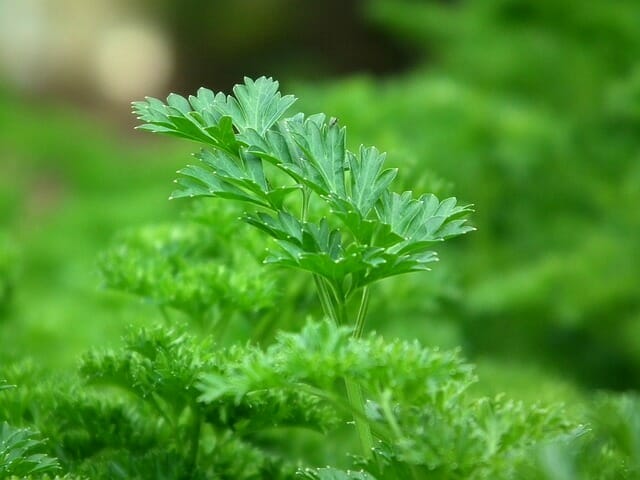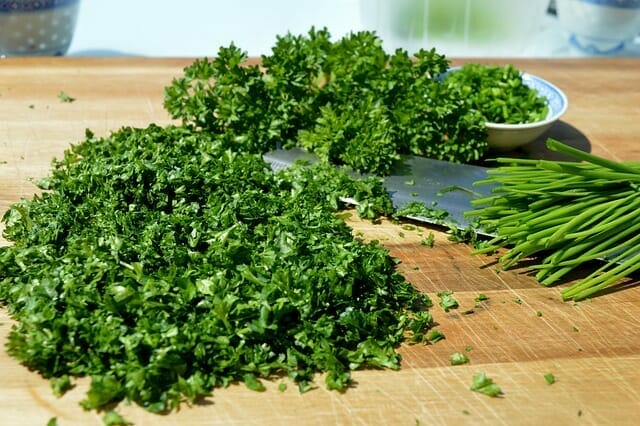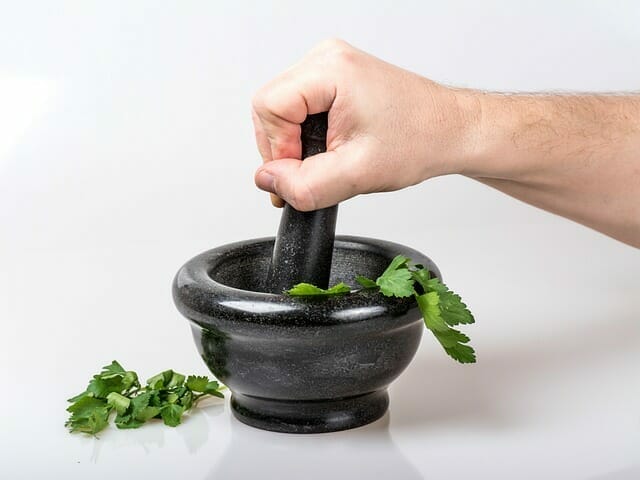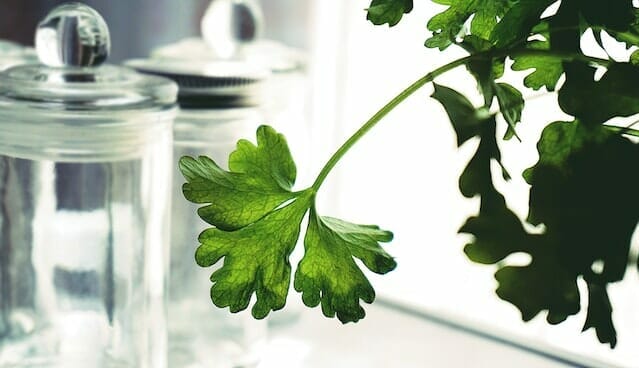Parsley is one of the most popular vegetables that is an indispensable ingredient in most soups. However, it is worth consuming not only for culinary reasons, but also for health reasons. First of all, parsley is a valuable ally of urinary health and a slayer of harmful microorganisms. Due to its high vitamin C content, parsley is an ally of good immunity. Just a handful of parsley is enough to fill the daily requirement for vitamin C. Learn all the benefits of parsley!
Table of contents
- 1 Parsley – an underestimated vegetable with high health value
- 2 Parsley root and parsley – nutritional values
- 3 Parsley – health-promoting properties
- 3.1 Parsley and the urinary system
- 3.2 Diastolic properties of parsley
- 3.3 Parsley for good digestion
- 3.4 Parsley’s detoxifying properties
- 3.5 Parsley for immunity and strengthening the body
- 3.6 Parsley’s disinfecting properties
- 3.7 Parsley and its beneficial effects on the cardiovascular system
- 3.8 Protective and strengthening effects of parsley on eyesight
- 3.9 Parsley’s powerful antioxidant properties
- 4 Medicinal uses of parsley
- 5 How to consume parsley for health-promoting purposes?
- 6 Parsley – use in the kitchen
- 7 How to store parsley leaves?
- 8 Parsley – contraindications
- 9 Parsley cultivation
Parsley – an underestimated vegetable with high health value
Parsley is a somewhat underrated vegetable, treated mainly as an element of stock for soups and a filler for vegetable salads. Meanwhile, on its own, it has a very interesting (albeit delicate) flavor. At the same time, it is extremely versatile in application. It can be incorporated into many dishes both cold and hot.
Parsley root has a sweetish, slightly spicy and slightly bitter taste. Parsley has a fresh, herbal, slightly bitter, slightly salty and slightly pungent flavor. Both root and parsley are also not lacking in distinct and diverse health-promoting qualities.
Parsley is a biennial plant included in the celery family. Its health-promoting properties have been used since ancient times. The plant is native to Morocco, Algeria and Tunisia. In its wild state it is found on the Apennine Peninsula, the Canary Islands, the Balkans and some parts of Africa. It is cultivated almost all over the world.
For commercial purposes, 2 types of parsley are cultivated: root par sley (it is mainly obtained from the roots, sometimes also the parsley leaves) and leaf parsley (it is harvested only from the parsley root, the root is inedible).
Parsley root and parsley – nutritional values

Both the root and parsley leaves are extremely rich in minerals and vitamins. This vegetable is one of the best sources of vitamin C, potassium and folic acid. There is also a rather rare vitamin K. Parsley also contains considerable amounts of dietary fiber and powerful antioxidants in the form of carotenoids and flavonoids. Parsley is a treasure trove of chlorophyll, which facilitates the removal of harmful substances from the body.
Since parsley is low in calories and has a low glycemic index, while being saturated with valuable nutrients, it is recommended for those on a weight loss diet.
Valuable components found in parsley are:
- vitamin C,
- provitamin A (beta-carotene),
- minerals (potassium, calcium, iron, magnesium, phosphorus, copper, manganese, zinc),
- B vitamins,
- vitamin K,
- vitamin E,
- dietary fiber,
- amino acids,
- carotenoids,
- flavonoids,
- furanocoumarins,
- chlorophyll,
- essential oil (and in it, among others: myristicin, eugenol, apiol, terpenes, limonene).
Parsley – health-promoting properties

Parsley root and parsley have positive effects on health. Their regular consumption will help us replenish vitamin and mineral deficiencies and improve immunity. What are the most important properties of parsley?
Parsley and the urinary system
Frequent consumption of parsley is a proven home remedy for improving the functioning of the urinary tract and a well-known method for combating persistent urinary complaints, such as urinary problems.
Parsley has a diuretic effect (it stimulates the kidneys to work and increases urine production), in addition to being anti-inflammatory, antibacterial and antiseptic. These four properties make it an effective way to fend off cystitis and various urinary tract infections.
What’s more, by acting as a diuretic while relaxing the smooth muscles of the urinary tract, parsley facilitates bladder emptying. Thus, it provides valuable support for prostate problems in men. What is worth adding, thanks to improving the work of the urinary tract, parsley regulates the process of urinary excretion and reduces the sensation of constant pressure on the bladder in people with incontinence problems.
Check out a multi-ingredient incontinence formula containing parsley extract: UrinoFix
Diastolic properties of parsley
Parsley exhibits diastolic properties. It reduces the smooth muscle tension of the gastrointestinal tract, biliary tract and urinary tract. Thus, it alleviates stomach and intestinal cramps, such as those that occur after eating a heavy meal, and is also helpful for menstrual pain. To relieve abdominal cramps, it is worth making and drinking a hot infusion of parsley.
Parsley for good digestion
Parsley root added to food improves intestinal motility, and helps relax smooth muscles in the perimeter of theIt also helps to relax the smooth muscles of the stomach and intestines, preventing abdominal pain, the feeling of fullness after eating, flatulence and constipation. It also accelerates the removal of accumulated intestinal gas. What’s more, parsley root and parsley stimulate the secretion of saliva and gastric juice, thus improving the process of food digestion.
Parsley’s detoxifying properties
Thanks to its diuretic properties, parsley stimulates and accelerates the process of cleansing the kidneys, liver and the entire body of toxins. At the same time, it helps get rid of excess water from the body, thus removing swelling, reducing the feeling of heaviness and leading to weight loss and reduction of water cellulite. An excellent patent for detoxing the body with parsley is to make and drink smoothies with parsley or parsley root every day (for about a week or more).
Parsley for immunity and strengthening the body
The vitamin C contained in parsley strengthens the immune system. It contributes to an increase in lymphocyte activity and helps to more efficiently capture and neutralize pathogens that invade the body. Thus, it reduces susceptibility to infections, and if they do occur, it helps to deal with them faster. What is also worth saying, parsley, thanks to its simultaneous content of vitamin C, iron and chlorophyll, is an ideal vegetable way to prevent and fight anemia.
An effective and simple way to improve immunity: NuviaLab Immune
Parsley’s disinfecting properties
Parsley works well as a bacterial inhibitor and disinfectant for inflammation of the mouth, gums, throat. We will prepare a disinfecting rinse from parsley in a very simple way: pour a handful of chopped parsley over a glass of boiling water. We also throw in some freshly grated ginger (or powdered) and cinnamon. After 10 minutes, we strain, cool and rinse the mouth and throat.
Parsley and its beneficial effects on the cardiovascular system
Thanks to its high content of vitamin C, flavonoids, potassium and magnesium, parsley is an ally of a healthy circulatory system. It helps normalize blood pressure and heart rhythm, strengthens and seals blood vessels and reduces the risk of cardiovascular disease. Thanks to vitaminK, it takes care of proper blood clotting.
Protective and strengthening effects of parsley on eyesight
Vitamin A, lutein, zeaxanthin, vitamin C – thanks to these components, parsley takes care of the health of the visual apparatus. It immunizes against harmful external factors (such as blue light), fights free radicals that act destructively on the structures of the eye and promotes proper vision.
Parsley’s powerful antioxidant properties
Thanks to its numerous antioxidants, parsley protects cells from damage and mutation, and reduces the likelihood of civilization diseases such as atherosclerosis, cancer, diabetes, hypertension.
Medicinal uses of parsley

Parsley cannot be denied good strengthening properties and beneficial effects on the blood. It supports its purification and improves its composition. Providing a large dose of iron, vitamin K, chlorophyll, folate and vitamin C, it combats anemia and all its symptoms, such as weakness, constant fatigue, palpitations, shortness of breath, headaches and fainting.
Parsley is an effective aid for weakness, anemia, nutritional deficiencies and lack of vitality. It is also worth reaching for it in such ailments as:
- urinary tract problems (e.g., decreased urine output, urinary incontinence, cystitis, urinary tract infections, constant pressure on the bladder, problem with emptying the bladder completely),
- prostate problems,
- kidney problems,
- rheumatism,
- gout,
- water retention in the body, swelling of the body, water cellulite,
- vitamin deficiencies,
- metabolic problems and accumulation of toxins in the body,
- palpitations, muscle tremors caused by potassium deficiency,
- high blood pressure,
- elevated cholesterol levels,
- anemia,
- skin infections,
- weakened eyesight, visual disturbances,
- digestive ailments (e.g. indigestion, flatulence).
How to consume parsley for health-promoting purposes?
Parsley consumption for health-promoting and medicinal purposes differs from consumption for culinary purposes. First of all, it should be used in sufficiently large quantities, that is, about 30 g – 50 g of fresh parsley per day or 1-2 roots per day.
The frequency of consumption also matters. If we want parsley to help us improve our health, it is best to reach for it several times a week or even daily (1-2 times a day), depending on the ailment. The duration of parsley use also depends on the type of health problem and its severity. Usually treatments lasting from 1 week to several weeks work well. We can also use parsley continuously, but in smaller doses and less frequently.
How you can use parsley to improve your health:
- drinking blender smoothies with parsley (root or parsley),
- drinking infusions of parsley root,
- drinking infusions of parsley root,
- drinking parsley oil,
- drinking parsley bio juice,
- eating health-promoting salads with lots of parsley,
- drinking herbal concoctions with parsley.
Parsley infusion: Pour a large handful of chopped parsley over a glass of boiling water, brew under a lid for 5-10 minutes, strain and drink.
Parsley root infusion: Pour a glass of boiling water over 2-3 tablespoons of powdered or crushed parsley root. We brew under a cover for 15 minutes. Strain and drink.
We use parsley infusions 2-3 times a day.
Parsley – use in the kitchen

Parsley root is best known as an ingredient in the popular vegetable mixture that is the base of broths and other soups, i.e., veggies. However, parsley root has many more uses, including proving itself as a component of one-pot vegetable dishes, salads, salads, stews, casseroles, meat and vegetable dishes.
Also, parsley can be used in dozens of ways. It works perfectly both cold and hot.
In the cold option we can use it as an ingredient in pastes and spreads for sandwiches, cottage cheese, rolls, dressings, dips, pesto sauces. On the other hand, tried-and-true hot dishes with parsley include: omelets and other egg dishes, vegetable chops, meatloaf, meatballs, meatballs and minced cutlets, pasta dishes, rice dishes, potato chops, soups and vegetable dishes, and cassoulettes.
Since fresh parsley is one of the herbs distinguished by its simultaneously fresh, herbaceous, refreshingrefreshing, as well as slightly pungent and salty flavor, it will also be great for dishes with seafood and fish in the lead role.
How to store parsley leaves?
Fresh parsley can be stored for several days in the refrigerator. Just remove the rubber band from the bunch, cut off the lower parts of the sprigs, put the parsley in a jar with a small amount of water and store the jar in the refrigerator.
Parsley can also be frozen. To do this, first rinse the parsley, dry it thoroughly, then chop it, put it in a plastic box or string bag and store it in the freezer.
Parsley – contraindications
The use of parsley or preparations containing parsley in large quantities is not advisable for everyone. It is worth remembering that parsley contains some oxalic acid and can increase the risk of kidney stones. People with stones and serious kidney diseases should be wary of it.
Parsley can cause uterine contractions and have an abortifacient effect, so pregnant women should also be wary of it.
Parsley cultivation
Growing parsley in the garden or in the field is extremely simple and trouble-free. The vegetable shows high resistance to frost and is undemanding. You only need to provide it with a sunny position and well-drained, plump soil. It is worth remembering to remove weeds within the crop. It is also important to water regularly, (as soon as the soil becomes slightly dry). The soil should not be waterlogged, but slightly moist.

